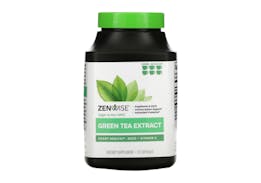Best Green Tea Extract
Find out which of our top five green tea extracts might fit your lifestyle and support your health goals.
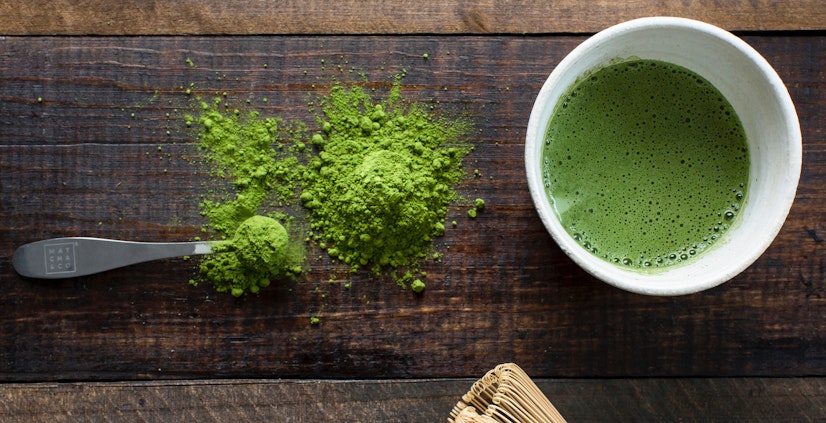
Throughout history, few beverages have captured the hearts and palates of people worldwide quite like tea. Its origins can be traced back at least 2,100 years to roots in the medicinal practices of ancient Asia,1 2 including the use of green tea for treating ailments like typhoid or digestive issues.3 4
While all tea comes from the same plant — Camellia sinensis — green tea is arguably the most studied variety due to its potential health benefits.3 5 In recent years, this research has suggested green tea may be able to help with a myriad of health concerns, including some cancers, cardiovascular concerns, inflammation, arthritis, neurological diseases, HPV-related diseases,6 and more.4
But it’s important to note that you likely won’t see these potential benefits just by having an occasional cup of green tea, as many of the studies demonstrating these positive outcomes involved participants who drank 3-5 cups or more per day.9 10 Not everyone has a love for green tea that compels them to drink multiple cups daily, and some people can’t even get the often-bitter drink past their lips.
In these scenarios, supplementing with a green tea extract may be an ideal solution, allowing you to reap the potential perks of green tea without having to double your daily liquid (and caffeine) consumption. If this sounds like a good choice for your lifestyle and health goals, our guide breaks down the research, pros, cons, and details surrounding our top five choices. If you’re in a hurry, here is a quick snapshot of our recommendations.
Summary of recommendations
- Best overall: Zenwise Green Tea Extract
- Runner-up: Zhou Nutrition Green Tea Extract
- Best budget pick: Vitacost Standardized Green Tea Extract
- Most potent formula: Zenwise Green Tea Extract
- Best decaffeinated: Vitacost Decaffeinated Green Tea Extract
- Best bulk option: PureBulk Green Tea Extract Powder
Zenwise Green Tea Extract provides high amounts of potentially health-boosting polyphenols at a reasonable price.
Each vegan capsule contains less caffeine than a cup of green tea, with much more EGCG. All orders are covered by an unlimited lifetime guarantee.
In this Review
Why you should trust us
Over the past two decades, Innerbody Research has been dedicated to empowering tens of millions of readers, supporting them in making well-informed decisions about maintaining their well-being and embracing healthier lifestyles.
Our approach involves comprehensive testing of each product or service we review, focusing on quality, the latest medical research, and current health standards. For this guide to the best green tea extract, we personally tried and investigated these supplements while thoroughly examining over 45 scientific articles and journals on the potential benefits, drawbacks, and key components of green tea extracts.
Additionally, like all health-related content on this website, this review was thoroughly vetted by one or more members of our Medical Review Board for accuracy.
Our top considerations
When choosing products to recommend, we examine various criteria. In the case of green tea extracts, we looked at safety, efficacy, cost, and convenience.
- Safety is our top priority — if you’re consuming something with hopes of boosting your health or well-being, it’d be counterproductive to take something potentially dangerous.
- The efficacy of a product isn’t always clear from a look at ingredient quantities, and certain factors can make one supplement more effective (and worth your time and money) than another.
- When you spend money on a product, you’re likely looking to find value in the item of your choice. While the total dollar amount certainly comes into play, we also evaluate what that gets you in the end.
- For green tea extract supplements, nearly all of them are more convenient than drinking half a dozen cups of tea every day. But certain aspects, like dosages, can make one supplement that much more convenient than its competitors.
Safety
Winner: PureBulk
When it comes to taking supplements, safety is extremely important. Since the FDA doesn’t approve supplements the same way they do medications, supplement companies must take extra steps to ensure they're producing safe products.11 This often involves maintaining current good manufacturing practice (cGMP or GMP), subjecting their products to independent third-party testing, and being transparent about ingredients.
A couple of the companies that produce our top picks — Zhou and Zenwise — do their own in-house testing rather than bringing in an independent third party. And Vitacost takes a unique approach to testing by requiring its manufacturers to provide a Certificate of Analysis that shows the ingredients and products conform to the company’s testing and safety specifications.
PureBulk, however, goes further than the competition through the use of independent third-party testing to make sure its supplements are safe. Additionally, the company makes it extremely easy for customers to request testing results and other product safety information. If you purchase a product from PureBulk, you’ll find a lot number on the front label. On the brand’s website, under the “Help” tab, you can find a link to the COA Request page, where you can request multiple quality and safety documents.
PureBulk products are also produced in a GMP-compliant facility, as are our other top picks — Zenwise (cGMP), Zhou (GMP), and Vitacost (cGMP).12
Efficacy
Winner: Zenwise
Different supplements have different reasons for being more or less effective. For some, it may be the dosage; for others, it could be the coating of its capsule. With green tea, both the beverage and the extract, the potential it holds for healthful outcomes is linked to its catechin content — particularly epigallocatechin gallate (EGCG).4 Researchers believe EGCG is responsible for a majority of green tea’s beneficial possibilities, such as a reduced risk for colorectal cancer.4 13
However, research has shown that the catechins and EGCG in brewed green tea have a tendency to break down or degrade. Zenwise green tea extract is the only one on our list that includes vitamin C (ascorbic acid) as an ingredient, which studies have suggested might not only prevent or reduce the degradation of catechins in your digestive system,19 but may also increase their bioavailability.20
This means that Zenwise’s green tea extract has a potentially higher chance of bringing you beneficial outcomes compared to the products from competitors that don’t include vitamin C as an ingredient (Zhou, Vitacost, PureBulk, and most of the others on the market). But before you discount any green tea extract without vitamin C, know that more research is necessary to confirm these findings.
Cost
Winner: Vitacost Green Tea Extract - Standardized
While the amount of money you have to spend on a supplement definitely matters, we also take into consideration details like ingredient amounts and servings when considering the cost. If a product is really inexpensive but doesn’t give you nearly as much of an ingredient as another product that costs an additional $2.00, we’d give the crown to the latter item.
Vitacost’s standardized green tea extract, however, manages to be the least expensive capsule option on our list while delivering equal or greater amounts of beneficial compounds as our runner-up option from Zhou Nutrition. The only thing that held back Vitacost from being our runner-up was its inclusion of gelatin, which makes it unsuitable for vegetarians and vegans. (Vitacost does offer a decaf variety of its green tea extract that is vegan-friendly, but it’s more expensive.)
The chart below compares some details of our overall winner, Zenwise, our runner-up, Zhou, and our best budget pick, Vitacost. As a quick note regarding terms in the chart: EGCG is a catechin, and catechins are a type of polyphenol found in green tea.21 These components are the building blocks that make up the total green tea extract.
| Zenwise | Zhou Nutrition | Vitacost | |
|---|---|---|---|
| Cost per bottle | $21.97 | $22.99 | $6.99 - $18.99 |
| Servings per bottle | 120 | 120 | 100 - 300 |
| Cost per serving | $0.18 | $0.19 | $0.06 - $0.07 |
| Green tea extract per serving | 725mg | 500mg | 500mg |
| Polyphenols per serving | 98% (710.5mg) | 95% (475mg) | 98% (490mg) |
| Catechins per serving | Undisclosed | 80% (400mg) | 80% (400mg) |
| EGCG per serving | 50% (362.5mg) | 50% (250mg) | 50% (250mg) |
Also, PureBulk technically offers the least expensive option per serving (equivalent to Vitacost in polyphenol, catechin, and EGCG content), but you’d need to spend over $1,000 for that $0.02 per dose — it’s a bulk purchase for 25kg (roughly 55lbs) of green tea extract powder. For a more typical purchase of PureBulk’s green tea extract in grams, you’d be paying closer to $0.10 for your daily dose, which is a few cents more than Vitacost.
Convenience
Winner: Zenwise
One of the perks of green tea extract is that it’s substantially more convenient to take than drinking several cups of green tea each day. But not every green tea extract is equally convenient; some people may prefer not having to mix PureBulk’s powders, for instance.
Our overall top pick, Zenwise, also wins our choice for convenience due to the dose it offers. In its one-capsule dose, you get 725mg of green tea extract with roughly 363mg of EGCG. This is the highest amount of EGCG available in our top choices and, because of the addition of vitamin C for greater stability and bioavailability, your body may utilize more of the compounds from Zenwise’s extract versus the competition.19 20
One of our other picks, Vitacost’s decaffeinated green tea extract, offers the same amount of green tea extract with about 326mg of EGCG per serving. Without the purported protection that vitamin C offers, your body might not have a chance to actually use most of that EGCG before it begins to degrade, though more research is needed to confirm this.
Additionally, on the business side of things, Zenwise offers subscription options and a lifetime guarantee. If you realize that the supplement isn’t right for you, you can reach out to customer service for a refund or to swap the product out at no additional cost, no matter when you ordered it.
How our top recommendations compare
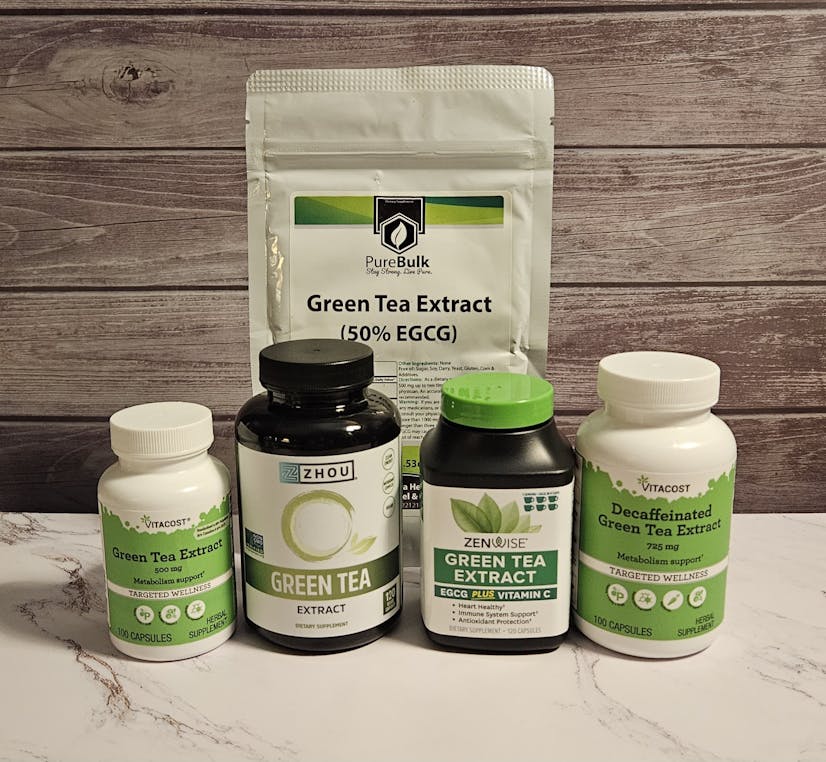
Photo by Innerbody Research
The chart below breaks down the details of our top picks in terms of costs, servings per bottle or package, the contents of a single serving, allergens, vegan-friendly status, subscription availability, and each company’s refund policy. More details on each product can be found in their respective sections later in this review.
Additionally, we compared the sizes of the capsules offered by each company. They’re all nearly identical in size and color, except for Vitacost’s standardized capsule, which was the smallest.

Photo by Innerbody Research
What is green tea extract?
Black, green, and oolong teas all come from the processed leaves of Camellia sinensis. The type of tea depends on the stage of leaf development and its processing post-harvest: black tea is fermented, green tea is non-fermented, and oolong tea is semi-fermented. Green tea is made from young tea leaves that are withered, then steamed or pan-fired, and dried. Overall, there’s very little processing done to prepare green tea.5
Green tea extract is a highly concentrated form of green tea.22 But, rather than infusing the leaves in water like you would when making a cup of tea, the caffeine and catechins are extracted from tea leaf scraps, often using organic solvents, and then emulsified into a powder.23
A few choice micronutrients are what make green tea such a potentially beneficial beverage. We’ll be focusing on polyphenols, catechins, and epigallocatechin gallate (EGCG), but green tea also offers:24
- L-theanine (an amino acid that may improve your mood, cognition, and stress levels)25
- Riboflavin
- Magnesium
- Potassium
- Niacin
- Thiamin
- Iron
- Vitamin B6
Polyphenols
Many different plants contain polyphenols, compounds that help plants to defend themselves against pathogens and damage from ultraviolet (UV) radiation. Some research shows that consuming diets rich in polyphenols may help prevent cancers, heart issues, diabetes, osteoporosis, and neurodegenerative diseases. Certain polyphenols, like resveratrol or quercetin, act as free radical scavengers.26
There are over 8,000 different polyphenolic compounds found across various plant species. But the four main classes of polyphenols those compounds fall into include:26
- Flavonoids
- Stilbenes
- Phenolic acids
- Lignans
Specifically, green tea is rich in flavonoids.27 Flavonoids are the largest group of polyphenols, containing over 4,000 different varieties that can affect certain aspects of a plant, like its color or taste.26 28 Catechins, abundant in green tea, are considered to be one of the most common flavonoids.26 27
Catechins
Green tea’s possible health benefits are often attributed to its catechin content.4 Catechins are a substance found in tea, cocoa, and berries that can help protect your cells from damage caused by free radicals (unstable molecules created during normal cell metabolism).7 8 While green tea is one of the best dietary sources of catechins, they’re also commonly found in foods such as:28 29
Several studies on catechins have demonstrated the antioxidative properties of these phytochemicals. They may help our body absorb healthy foods more effectively, protect our skin from UV damage,30 and minimize inflammation associated with allergies and inflammatory bowel disease.31 Green tea catechins also show potential in the treatment and prevention of infectious diseases,32 including COVID-19.33
There are four different types of catechins found in green tea:32
- Epicatechin
- Epicatechin-3-gallate
- Epigallocatechin
- Epigallocatechin gallate (EGCG)
Last on the list, EGCG, is the most abundant green tea catechin,17 and it’s been extensively studied due to its association with a wide range of potential health benefits.27
Epigallocatechin gallate (EGCG)
Of the four kinds of catechins mainly found in green tea, current research points to EGCG being the powerhouse. A handful of this catechin’s suggested effects include:27 34
- Inhibiting tumor growth
- Preventing some cancers
- Increasing antioxidant activity
- Reducing inflammation
- Fighting or preventing viruses
- Lowering low density lipoprotein (LDL, or “bad”) cholesterol35
EGCG is also the primary chemical thought to be responsible for green tea’s thermogenic properties, meaning it might be able to help you lose weight.36
More research on the effects of EGCG, specifically in humans, is needed to confirm these effects. But, the fairly large body of research suggesting that EGCG can boost your health in numerous ways is why you’ll almost always find the percent of this catechin listed on the supplement facts label of green tea extracts.
Potential benefits of green tea
There are dozens of potential applications for green tea, but most of them still need much more research before we can say they’re definitely true. Based on the research that does exist, it’s proposed that green tea could help fight or prevent:4
- Several types of cancer37
- Cardiovascular diseases38
- Inflammatory bowel disease (IBD)31
- Type 2 diabetes
- High cholesterol35
- Obesity or overweight36
- Metabolic syndrome39
- Herpes (specifically, herpes simplex virus-1 (HSV-1))40
- Alzheimer’s disease
- Parkinson’s disease
Obviously, that’s a lot to ask from a cup of tea. And most of these proposed benefits are still theories or only tested in animal models, meaning that we don’t know for sure if green tea can help humans in the same way. The only FDA-approved use of green tea is in the topical ointment, Veregen (sinecatechins), which is used to treat genital warts.3
The list of diseases and disorders that green tea may or may not help stretches on longer than this review. If you’ve been prescribed medication by your doctor, it’s not recommended you switch it out for a green tea supplement. And, as with any supplement, make sure you consult your doctor before taking it.
Green tea extract versus drinking tea
The differences between green tea extract and steeped tea play out in dosing. One cup of green tea made from a tea bag at home has about 100-150mg of polyphenols (about 75% of which are EGCG when brewed correctly).41 Green tea extracts range from 45% to 50% EGCG, resulting in a lower EGCG-to-polyphenol ratio but more EGCG overall.
Most studies look at the amount of EGCG in each serving to determine a healthy dose. Taking around 300mg of EGCG daily should potentially be enough to see benefits without any side effects,34 42 though studies have shown that you can take up to 675mg without risking your health.43 Doses upward of 800mg EGCG daily (or about 1,500mg of green tea extract per day) can cause liver damage in some people.42 Our top picks have 250mg-450mg of EGCG per serving. To get the same amount of EGCG as one serving of our green tea extract picks, you’d need to drink 2-4 cups of green tea per day.
Insider Tip: Polyphenols taste very bitter, so a plain green tea that’s less sweet is more likely to be better for you.44
Additionally, green tea extract is also more stable long-term than brewed green tea. In a study from 2009, researchers examined how six months of storage affected the catechin content of eight different commercially sold teas. They found that, even in the absence of moisture, EGCG content decreased by 28% on average.14 And other unrelated studies have focused on how various steeping methods and temperatures can alter EGCG content,15 often with some conflicting results.16 17 Whether tea is prepared hot or cold or stored as the leaf in a cool, dry place, it appears that EGCG will almost always degrade.
But the breakdown of catechins doesn’t end there. When subjected to simulated stomach and small intestine digestion in a 2007 study, three of the main catechins in green tea (including EGCG) were “significantly degraded.”18 This means that once these catechins reach your stomach, they may break down faster than your body can use them.
However, certain things, like the addition of vitamin C (ascorbic acid), have been shown to prevent or reduce the degradation of catechins in your digestive system and potentially increase their bioavailability.19 20 This is one of the reasons why Zenwise was chosen as our top green tea extract — its inclusion of vitamin C.
Special Offer from Zhou: Save 20% When You Subscribe
Who should avoid green tea extract?
The National Institutes of Health recommends staying away from green tea extract if you take beta-blockers like nadolol. In high doses, green tea can lower the amount of blood in your body, so it interacts poorly with medications used for high blood pressure and heart problems. And if you’re pregnant or lactating, green tea may increase the risk of birth defects associated with folic acid deficiency.3
The most serious risk you face when taking green tea extract, though, is liver damage. Supplements high in catechins are more likely to cause liver damage when taken in extremely large doses. Very few green tea extracts have enough catechins to cause harm, but when green tea extract is used in bulk in weight loss supplements, you’re more likely to find these dangerous side effects.
There’s no clear scientific consensus on how or why this liver damage happens, but EGCG concentrates in the liver four times faster than it does in your blood. Some studies have shown that green tea extract also increases your alanine aminotransferase (ALT) levels, but it’s unknown if that’s a cause or an effect of liver damage.45
These liver problems are more likely to occur when you take more than 800mg of EGCG per day.46 If you have a history of liver disease or a family history of acute liver failure, talk to your doctor before starting a green tea extract.
Zenwise Green Tea Extract
Best overall and most potent formula
Pros
- Contains vitamin C that may lessen degradation of catechins
- Certified vegan
- Manufactured following strict cGMP guidelines
- Tests all finished products in-house
- Strong customer service
- 100% lifetime money-back guarantee
- Subscribe & Save 15%
- Free shipping to the contiguous U.S.
Cons
- No third-party testing
- Total catechins are undisclosed

Photo by Innerbody Research
Each container of Zenwise’s green tea extract holds 120 servings of 725mg green tea extract with 98% polyphenols (710.5mg) and 50% EGCG (362.5mg). While Zenwise is tied with Vitacost’s decaffeinated green tea extract in terms of total extract and polyphenols, it does manage to just beat the competition in EGCG by about 40mg.

Photo by Innerbody Research
Each one-pill serving of Zenwise’s extract also contains 60mg of vitamin C as ascorbic acid. The company states that this is for extra immune system support, but some studies show that vitamin C can prevent the breakdown of green tea catechins and improve bioavailability.19 20 It may be a happy accident, but it’s one of the main reasons Zenwise earned our choice for top pick and most potent formula. There are green tea extracts on the market that contain more extract overall, but catechins can degrade pretty fast in the digestive system.18 With vitamin C to protect against this degradation, Zenwise may allow your body a better chance to absorb more catechins.
Insider Tip: Sign up for Zenwise’s newsletter at the bottom of the website to get 25% off of your first order.
The caffeine content in this supplement is 14mg (or less), which is about half of the caffeine in an 8oz cup of brewed green tea.47 This is only 1mg less than the caffeine content in our runner-up choice from Zhou Nutrition. And both are well below the average amount of caffeine in an 8oz cup of coffee — 96mg.47
The size of Zenwise’s green tea extract capsules is fairly average for a supplement. They’re nearly indistinguishable from Zhou Nutrition’s and Vitacost’s decaf green tea extract capsules. The smallest pills out of our choices come from Vitacost’s caffeinated variety. But, despite not being the smallest pill, the capsules from Zenwise are still easy to swallow and completely flavorless.

Photo by Innerbody Research
Pricing
Ordering from Zenwise is as easy as ordering from your typical online store. You can choose between a one-time purchase for $21.97 or a subscription plan, which sends you a new bottle at 30, 60, or 90 days for $18.67 each (15% off). This is the highest subscription discount offered by any of our top picks; the next closest is Vitacost’s 10% off.
You can order Zenwise’s green tea extract directly from its website if you live in the United States. Orders to the continental United States always have free standard shipping and arrive in 2-5 business days. You’ll have to pay a variable shipping fee if you’re ordering from Alaska or Hawaii.
Uniquely, Zenwise offers a 100% lifetime money-back and risk-free guarantee (all of our other choices have refund policies between 60 and 90 days). At any point, if you decide the supplement doesn’t agree with your body or you aren’t feeling any positive effects, you can reach out to customer service for alternative options. This might look like a full refund, a partial refund, or a different product shipped to you at no cost, depending on what fits your needs.
When we reached out to customer service for clarity around this policy, the representatives our testers spoke with in Zenwise’s in-browser chat replied within a minute and quickly had a clear, detailed answer.
Zhou Nutrition Green Tea Extract
Runner-up overall
Pros
- Vegan-friendly
- Manufactured to GMP standards
- Non-GMO verified
- 60-day money-back guarantee
- Free shipping on orders over $30
- Offers a rewards program
- 5% off if you subscribe through Amazon
Cons
- Unclear who tests products
- Subscription is only through Amazon
- The most expensive option per serving of our picks
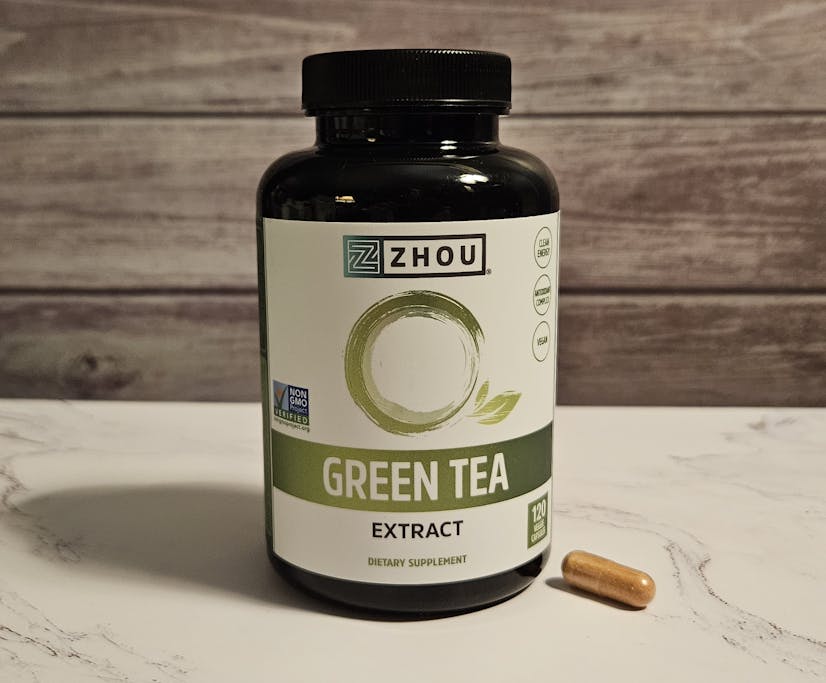
Photo by Innerbody Research
Zhou Nutrition’s green tea extract earned our choice for runner-up thanks to a decent amount of EGCG in a vegan-friendly capsule. Vitacost’s caffeinated green tea extract, in comparison, is nearly identical (it actually offers more total polyphenols) but comes in a capsule made with gelatin. Zhou Nutrition’s green tea extract also comes with 120 single-capsule servings, like our top pick, Zenwise.
The capsule appearance is almost identical to that of Zenwise, and they’re just as easy to take. And, while not horrible, Zhou’s capsules do taste a bit like cardboard. This shouldn’t be an issue for most, but if you’re particularly sensitive to the taste of supplements or medication, this could be something to keep in mind.
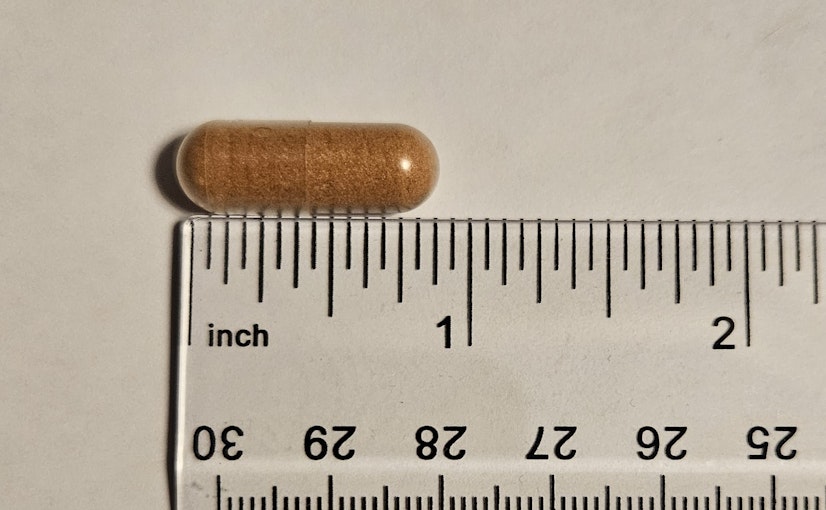
Photo by Innerbody Research
Capsule aside, the inside of this supplement is made up of 500mg of green tea extract, consisting of 95% polyphenols (475mg), 80% catechins (400mg), and 50% EGCG (250mg). Similar to Zenwise, Zhou’s green tea extract contains 15mg of caffeine. Additionally, the company makes it easy to find the total catechin content (unlike Zenwise) and the total caffeine content (unlike Vitacost). While these are small details, we appreciate Zhou Nutrition’s additional transparency.
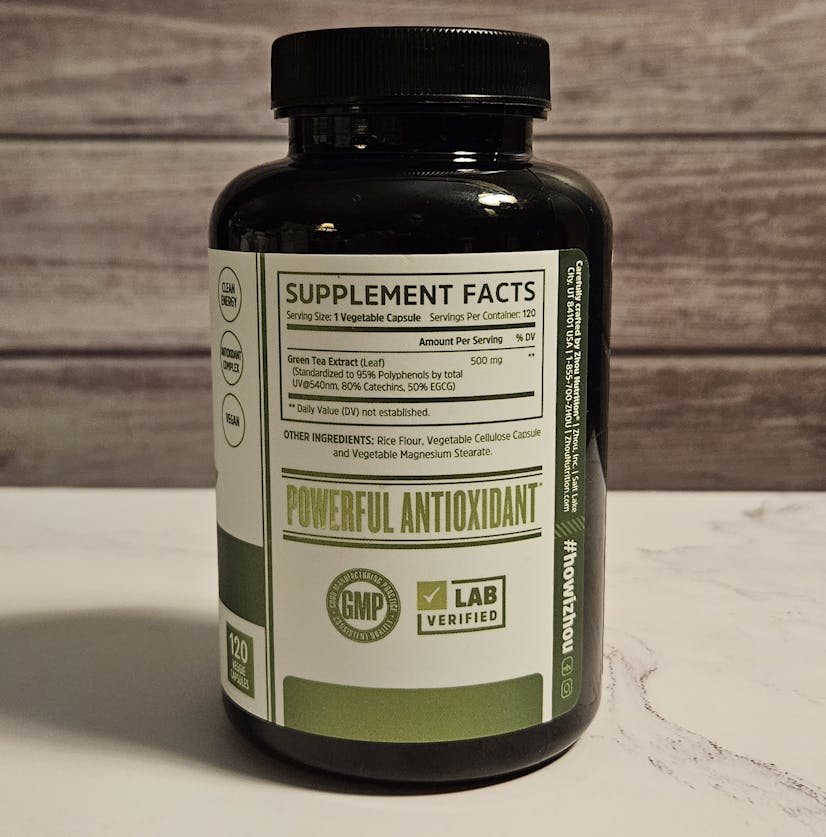
Photo by Innerbody Research
While Zhou Nutrition claims to “lab-verify” both its ingredients and the final products, it’s unclear whether or not it’s done in-house, like Zenwise, or done by a third party. We wish Zhou Nutrition (and other competitors) were as thorough in its safety transparency as PureBulk, which offers multiple easily-accessible safety documents for consumers on request.
Pricing
There are two purchasing options for Zhou’s Green Tea Extract. You can either purchase it from Zhou Nutrition’s website or on Amazon — both options are $22.99. Zhou’s website used to offer a subscription plan, but this doesn’t seem to be available anymore, at least for its green tea extract. You can, however, subscribe on Amazon to save 5%, bringing the price per bottle down to $21.84.
Whether you purchase directly from Zhou or on Amazon, your order is eligible for the brand’s 60-day money-back guarantee. Even if you’ve opened and tried a few capsules, if you find it isn’t for you, you can just send an email to customer service, and you’ll get a full refund within a few days.
Vitacost
Best budget pick and best decaffeinated option
Pros
- Highly cost-effective options
- Decaf variety is nearly equivalent to our top choice
- Subscription saves you 10% off
- 60-day refund policy
- Standardized option has small capsule size
Cons
- Caffeinated variety contains gelatin
- Caffeine content in caffeinated item is undisclosed
- Testing policy is vague
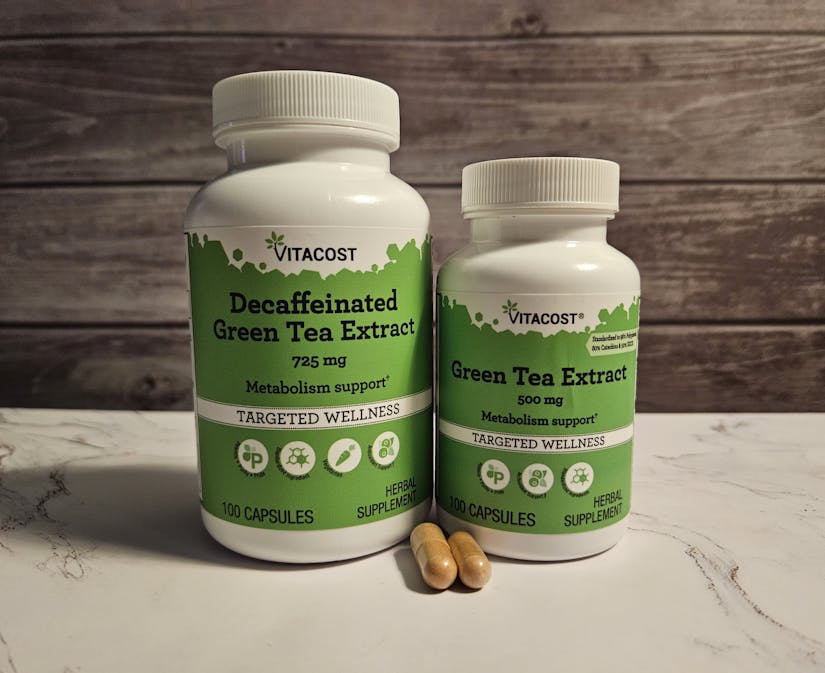
Photo by Innerbody Research
Two of Vitacost’s green tea extract options made it to our top picks — the original “standardized” version with caffeine and the brand’s decaf option. The standardized version is comparable in dosage to Zhou Nutrition, while the decaf variety is pretty close to that of Zenwise. Unfortunately, things like vague testing and safety procedures (“rigorous testing and safety specifications”) and the inclusion of gelatin kept these two otherwise very nice products from being higher up on our list.

Photo by Innerbody Research
The chart below breaks down the differences between the two Vitacost options.
| Standardized | Decaf | |
|---|---|---|
| Serving size | 1 capsule | 1 capsule |
| Green tea extract per serving | 500mg | 725mg |
| Polyphenols per serving | 98% (490mg) | 98% (710.5mg) |
| Catechins per serving | 80% (400mg) | 75% (543.75mg) |
| EGCG per serving | 50% (250mg) | 45% (326.25mg) |
| Caffeine? | Yes, but the amount isn’t specified | No |
Interestingly, the standardized version has a smaller capsule than the decaf. While the argument could be made that it contains less green tea extract, it contains the same amount as found in Zhou’s, which has the same capsule size as the Vitacost decaf option.
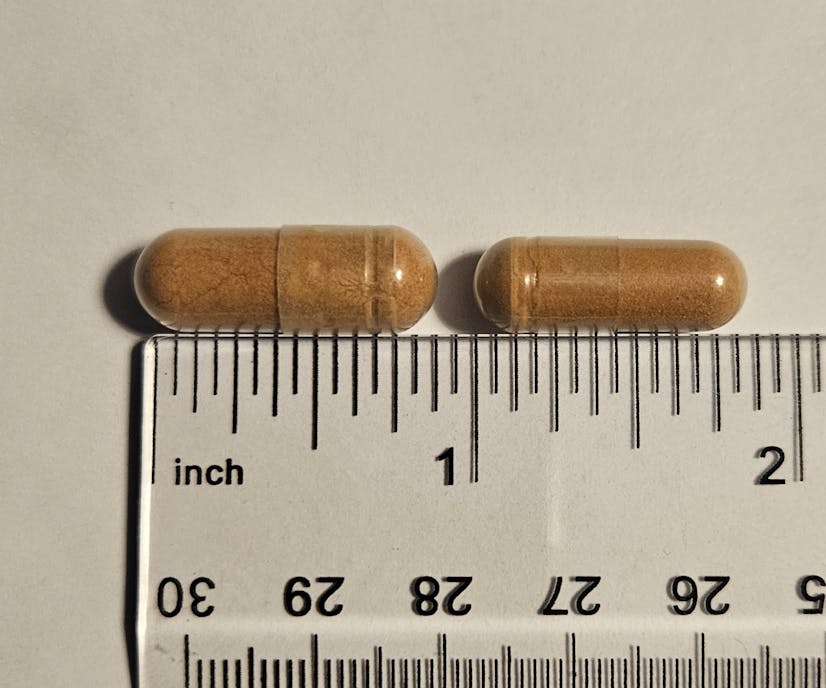
Photo by Innerbody Research
Either way, our testers had no complaints or issues with taking either of Vitacost’s offerings, though the standardized one was a little bit easier to swallow.
Pricing
Vitacost products can be found on multiple online storefronts (Amazon, Walmart, and so on) and in many brick-and-mortar stores. For the purpose of this review, we’ll just be discussing the pricing on Vitacost’s website. When you purchase through the company’s online storefront, you have the option to subscribe and save 10% on your order (5% less than Zenwise). The autoship can be adjusted to send you a bottle every 15, 30, 45, 60, 90, or 120 days.
The chart below breaks down the cost difference between single purchase and subscription deals of both the standardized and decaf versions of Vitacost’s green tea extract.
| Standardized | Decaf | |
|---|---|---|
| Servings per bottle | 100 - 300 | 100 - 200 |
| Cost per bottle; single purchase | $6.99 - $18.99 | $14.24 - $26.99 |
| Cost per serving; single purchase | $0.06 - $0.07 | $0.13 - $0.14 |
| Cost per bottle; subscription | $6.29 - $17.09 | $12.82 - $24.29 |
| Cost per serving; subscription | $0.05 - $0.06 | $0.12 - $0.13 |
In terms of refunds, Vitacost (like Zhou) offers a 60-day policy length. If you’re unsatisfied with your order in any way, you can reach out to the company’s customer service center to request a refund or replacement within the time limit.
PureBulk
Best bulk option
Pros
- Extensive transparency around testing and safety
- Capsule and powder options available
- Vegetarian capsule offered
- Lists the research behind green tea on the product page
- 90-day refund policy
- Discounts available for first responders, military personnel, and teachers
Cons
- Some size options can be expensive
- Refund requires unopened product
- No subscription available

Photo by Innerbody Research
PureBulk offers a nice variety of options for purchasing several hundred servings of green tea extract at reasonable prices. The two main categories available are bags of powder and capsules, but there’s also a large bulk purchase option. We’ve broken down the capsule and bag choices for you in the list below. Something to note is that PureBulk’s capsules are available in both gelatin and veggie options, which we appreciate.
| Veg Capsules | Gelatin Capsules | Bags | |
|---|---|---|---|
| Sizes | 120 or 300 count | 120 or 300 count | 100g, 250g, 500g, or 1kg |
| Servings | 1 capsule per serving; 120 - 300 servings per bottle | 1 capsule per serving; 120 - 300 servings per bottle | 500mg per serving; 200 - 2,000 servings per bag |
What PureBulk labels as the “bulk” option for its green tea extract is a 25kg (55lbs) container of powder — this is about 50,000 servings and it’ll run you $1,238.05. If you take only one 500mg serving a day, then this bulk purchase would last you about 136 years. This massive amount of green tea extract is likely better suited for families who all take the supplement or even businesses, like a café that adds it to drinks.
No matter what size or form you purchase PureBulk’s green tea extract in, the supplement facts and serving size are the exact same.
- 500mg green tea extract
- 98% polyphenols (490mg)
- 80% catechins (400mg)
- 50% EGCG (250mg)
- 2% or less of caffeine (10mg)
These amounts are nearly identical to those found in Zhou Nutrition’s and Vitacost’s standardized green tea extract. The only difference is that PureBulk’s extract seems to have less caffeine than Zhou’s (and Vitacost’s caffeine content is unknown).

Photo by Innerbody Research
While we don’t have experience with PureBulk’s capsules, we did try its powdered green tea extract, which dissolved very quickly when put in cold water and whisked. You only need to use a little less than ¼ of a teaspoon to get 500mg, so it’s not much powder. However, even on the back of the bag, PureBulk recommends using an “accurate gram weight scale” to measure it out. This could definitely be a turnoff for some people looking to quickly add green tea extract to their day, but luckily the capsule options exist.
If you do go for the powdered option, be warned that it is extremely bitter — emphasis on extremely. Our testers came to the conclusion that any unsweetened beverage is likely not the best option for taking powdered green tea extract. However, this strong bitterness is what indicates that the product is truly full of polyphenols.44 48
Another way to know the content of your PureBulk purchase (besides bitterness) is to request a COA from the company’s COA Request page. Here you can request six different documents:
- COA (certificate of analysis)
- MSDS (material safety data sheet)
- Vegan statement
- Allergen statement
- Nutritional statement
- BSE/TSE (a statement on if measures are used to minimize the risk of contamination from bovine spongiform encephalopathy — “mad cow disease” — or other transmissible spongiform encephalopathies)
To request this information, you check off the documents you’re interested in and fill in your name, email address, the product name, lot number, and any additional comments you may have. You’ll almost immediately get an email confirming that the company received your request (which we appreciated). On the COA Request page, PureBulk notes that, due to a high volume of requests, it may take up to 48 hours for your request to be fulfilled. However, we asked for all six available documents and received them within eight hours. The picture below is just a small snippet of the information PureBulk sent to us.

Photo by Innerbody Research
Pricing
While we already mentioned the price of the largest bulk green tea extract option — $1,238.05 for 25kg — the other offerings cost a lot less. Those prices are broken down in the small chart below.
| Veg Capsules | Gelatin Capsules | Bags | |
|---|---|---|---|
| Prices | $16.37 (120ct); $35.20 (300ct) | $14.07 (120ct); $30.25 (300ct) | $11.83 (100g); $25.30 (250g); $45.65 (500g); $82.50 (1kg) |
| Cost per serving | $0.14 - $0.12 | $0.12 - $0.10 | $0.05 - $0.04 |
PureBulk would’ve been our runner-up in place of Zhou Nutrition if the company offered a subscription deal and was a little less strict with its refund policy. If you want to return your purchase to PureBulk, only an unopened product sent back within 90 days will get you a full refund. An opened product means you’ll only get a refund equal to the cost of the smallest size sold in that product. So, if you purchased the 1kg green tea extract powder for $82.50, opened it, and wanted to return it, you’d only get $11.83 back. This policy pales in comparison to our top choice Zenwise, which has no time limit and offers whatever fits your needs (refund, new product, and so on).
And while PureBulk may not have subscription deals, the company does offer 15% off for certain professions — first responders, military personnel, and teachers.
FAQ about green tea extract
Sources
Innerbody uses only high-quality sources, including peer-reviewed studies, to support the facts within our articles. Read our editorial process to learn more about how we fact-check and keep our content accurate, reliable, and trustworthy.
Heiss, M., & Heiss, R. (2007). The Story of Tea: A Cultural History and Drinking Guide. Ten Speed Press.
Lu, H., Zhang, J., Yang, Y., Yang, X., Xu, B., Yang, W., Tong, T., Jin, S., Shen, C., Rao, H., Li, X., Lu, H., Fuller, D. Q., Wang, L., Wang, C., Xu, D., & Wu, N. (2016). Earliest tea as evidence for one branch of the Silk Road across the Tibetan Plateau. Scientific Reports, 6, 18955.
National Center for Complementary and Integrative Health. (2020). Green tea. NIH.
Chacko, S. M., Thambi, P. T., Kuttan, R., & Nishigaki, I. (2010). Beneficial effects of green tea: a literature review. Chinese Medicine, 5, 13.
Khan, N., & Mukhtar, H. (2012). Tea and Health: Studies in Humans. Current Pharmaceutical Design, 19(34), 6141.
Miyoshi, N., Tanabe, H., Suzuki, T., Saeki, K., & Hara, Y. (2020). Applications of a Standardized Green Tea Catechin Preparation for Viral Warts and Human Papilloma Virus-Related and Unrelated Cancers. Molecules (Basel, Switzerland), 25(11), 2588.
National Cancer Institute. (n.d.). Catechin. NIH.
Dias, T. R., Alves, M. G., Silva, B. M., & Oliveira, P. F. (2018). Nutritional Factors and Male Reproduction. Encyclopedia of Reproduction (Second Edition), 458-464.
Kokubo, Y., Iso, H., Saito, I., Yamagishi, K., Yatsuya, H., Ishihara, J., Inoue, M., & Tsugane, S. (2013). The impact of green tea and coffee consumption on the reduced risk of stroke incidence in Japanese population: the Japan public health center-based study cohort. Stroke, 44(5), 1369–1374.
Kuriyama, S., Shimazu, T., Ohmori, K., Kikuchi, N., Nakaya, N., Nishino, Y., Tsubono, Y., & Tsuji, I. (2006). Green tea consumption and mortality due to cardiovascular disease, cancer, and all causes in Japan: the Ohsaki study. JAMA, 296(10), 1255–1265.
U.S. Food & Drug Administration. (2022). Questions and Answers on Dietary Supplements. FDA.
U.S. Food & Drug Administration. (2023). Facts About the Current Good Manufacturing Practices (CGMP) FDA.
Du, G. J., Zhang, Z., Wen, X. D., Yu, C., Calway, T., Yuan, C. S., & Wang, C. Z. (2012). Epigallocatechin Gallate (EGCG) is the most effective cancer chemopreventive polyphenol in green tea. Nutrients, 4(11), 1679–1691.
Friedman, M., Levin, C. E., Lee, U., & Kozukue, N. (2009). Stability of Green Tea Catechins in Commercial Tea Leaves during Storage for 6 Months. Journal of Food Science, 74(2), H47-H51.
Lantano, C., Rinaldi, M., Cavazza, A., Barbanti, D., & Corradini, C. (2015). Effects of alternative steeping methods on composition, antioxidant property and colour of green, black and oolong tea infusions. Journal of Food Science and Technology, 52(12), 8276-8283.
Chen, Z., Zhu, Q. Y., Tsang, D., & Huang, Y. (2001). Degradation of green tea catechins in tea drinks. Journal of Agricultural and Food Chemistry, 49(1), 477–482.
Wang, R., Zhou, W., & Jiang, X. (2008). Reaction kinetics of degradation and epimerization of epigallocatechin gallate (EGCG) in aqueous system over a wide temperature range. Journal of Agricultural and Food Chemistry, 56(8), 2694–2701.
Neilson, A. P., Hopf, A. S., Cooper, B. R., Pereira, M. A., Bomser, J. A., & Ferruzzi, M. G. (2007). Catechin degradation with concurrent formation of homo- and heterocatechin dimers during in vitro digestion. Journal of Agricultural and Food Chemistry, 55(22), 8941–8949.
Green, R. J., Murphy, A. S., Schulz, B., Watkins, B. A., & Ferruzzi, M. G. (2007). Common tea formulations modulate in vitro digestive recovery of green tea catechins. Molecular Nutrition & Food Research, 51(9), 1152-1162.
Furniturewalla, A., & Barve, K. (2022). Approaches to overcome bioavailability inconsistencies of epigallocatechin gallate, a powerful anti-oxidant in green tea. Food Chemistry Advances, 1, 100037.
Kim, H. S., Quon, M. J., & Kim, J. A. (2014). New insights into the mechanisms of polyphenols beyond antioxidant properties; lessons from the green tea polyphenol, epigallocatechin 3-gallate. Redox Biology, 2, 187–195.
Cleveland Clinic, & Todorov, I. (2022). Is Green Tea Extract Beneficial? Cleveland Clinic.
Perva-Uzunalić, A., Škerget, M., Knez, Ž., Weinreich, B., Otto, F., & Grüner, S. (2006). Extraction of active ingredients from green tea (Camellia sinensis): Extraction efficiency of major catechins and caffeine. Food Chemistry, 96(4), 597-605.
U.S. Department of Agriculture. (2019). Beverages, tea, green, brewed, regular. FoodData Central.
Williams, J. L., Everett, J. M., D'Cunha, N. M., Sergi, D., Georgousopoulou, E. N., Keegan, R. J., McKune, A. J., Mellor, D. D., Anstice, N., & Naumovski, N. (2020). The Effects of Green Tea Amino Acid L-Theanine Consumption on the Ability to Manage Stress and Anxiety Levels: a Systematic Review. Plant Foods for Human Nutrition (Dordrecht, Netherlands), 75(1), 12–23.
Pandey, K. B., & Rizvi, S. I. (2009). Plant polyphenols as dietary antioxidants in human health and disease. Oxidative Medicine and Cellular Longevity, 2(5), 270-278.
Musial, C., Kuban-Jankowska, A., & Gorska-Ponikowska, M. (2020). Beneficial Properties of Green Tea Catechins. International Journal of Molecular Sciences, 21(5).
Panche, A. N., Diwan, A. D., & Chandra, S. R. (2015). Flavonoids: An overview. Journal of Nutritional Science, 5.
Zanwar, A. A., Badole, S. L., Shende, P. S., Hegde, M. V., & Bodhankar, S. L. (2014). Antioxidant Role of Catechin in Health and Disease. Polyphenols in Human Health and Disease, 267-271.
Bae, J., Kim, N., Shin, Y., Kim, S., & Kim, Y. (2020). Activity of catechins and their applications. Biomedical Dermatology, 4, 8.
Fan, Y., Sang, X., & Jiang, M. (2017). Catechins and Their Therapeutic Benefits to Inflammatory Bowel Disease. Molecules: A Journal of Synthetic Chemistry and Natural Product Chemistry, 22(3).
Reygaert, W. C. (2017). Green Tea Catechins: Their Use in Treating and Preventing Infectious Diseases. BioMed Research International, 2018.
Park, J., Park, R., Jang, M., & Park, I. (2021). Therapeutic Potential of EGCG, a Green Tea Polyphenol, for Treatment of Coronavirus Diseases. Life, 11(3).
Singh, B. N., Shankar, S., & Srivastava, R. K. (2011). Green tea catechin, epigallocatechin-3-gallate (EGCG): Mechanisms, perspectives and clinical applications. Biochemical Pharmacology, 82(12), 1807.
Momose, Y., Maeda-Yamamoto, M., & Nabetani, H. (2016). Systematic review of green tea epigallocatechin gallate in reducing low-density lipoprotein cholesterol levels of humans. International Journal of Food Sciences and Nutrition, 67(6), 606–613.
Lee, S., Shin, Y., Jung, S., & Kim, Y. (2016). Effects of epigallocatechin-3-gallate on thermogenesis and mitochondrial biogenesis in brown adipose tissues of diet-induced obese mice. Food & Nutrition Research, 61(1).
Fujiki, H., Sueoka, E., Watanabe, T., & Suganuma, M. (2015). Primary Cancer Prevention by Green Tea, and Tertiary Cancer Prevention by the Combination of Green Tea Catechins and Anticancer Compounds. Journal of Cancer Prevention, 20(1), 1-4.
Kuriyama, S. (2008). The Relation between Green Tea Consumption and Cardiovascular Disease as Evidenced by Epidemiological Studies. The Journal of Nutrition, 138(8), 1548S-1553S.
Liu, W., Wan, C., Huang, Y., & Li, M. (2020). Effects of tea consumption on metabolic syndrome: A systematic review and meta-analysis of randomized clinical trials. Phytotherapy Research, 34(11), 2857-2866.
Patel, S., Adams, S. and Lee, L. (2018). Inhibition of Herpes Simplex Virus-1 by the Modified Green Tea Polyphenol EGCG-Stearate. Advances in Bioscience and Biotechnology, 9, 679-690.
Kowalska, J., Marzec, A., Domian, E., Galus, S., Ciurzyńska, A., Brzezińska, R., & Kowalska, H. (2021). Influence of Tea Brewing Parameters on the Antioxidant Potential of Infusions and Extracts Depending on the Degree of Processing of the Leaves of Camellia sinensis. Molecules, 26(16).
Hu, J., Webster, D., Cao, J., & Shao, A. (2018). The safety of green tea and green tea extract consumption in adults – Results of a systematic review. Regulatory Toxicology and Pharmacology, 95, 412-433.
Cappelli, F., Martone, R., Taborchi, G., Morini, S., Bartolini, S., Angelotti, P., Farsetti, S., Di Mario, C., & Perfetto, F. (2018). Epigallocatechin-3-gallate tolerability and impact on survival in a cohort of patients with transthyretin-related cardiac amyloidosis. A single-center retrospective study. Internal and Emergency Medicine, 13(6), 873–880.
Soares, S., Kohl, S., Thalmann, S., Mateus, N., Meyerhof, W., & De Freitas, V. (2013). Different phenolic compounds activate distinct human bitter taste receptors. Journal of Agricultural and Food Chemistry, 61(7), 1525–1533.
National Institute of Diabetes and Digestive and Kidney Diseases. (2012). LiverTox: Clinical and Research Information on Drug-Induced Liver Injury. NIH.
Younes, M., Aggett, P., Aguilar, F., Crebelli, R., Dusemund, B., Filipič, M., Frutos, M. J., Galtier, P., Gott, D., Gundert-Remy, U., Lambré, C., Leblanc, C., Lillegaard, I. T., Moldeus, P., Mortensen, A., Oskarsson, A., Stankovic, I., Waalkens-Berendsen, I., Woutersen, R. A., . . . Wright, M. (2018). Scientific opinion on the safety of green tea catechins. EFSA Journal, 16(4), e05239.
Mayo Clinic. (2022). Caffeine content for coffee, tea, soda and more. Mayo Foundation for Medical Education and Research (MFMER).
Soares, S., Silva, M. S., García-Estevez, I., Groβmann, P., Brás, N., Brandão, E., Mateus, N., de Freitas, V., Behrens, M., & Meyerhof, W. (2018). Human Bitter Taste Receptors Are Activated by Different Classes of Polyphenols. Journal of Agricultural and Food Chemistry, 66(33), 8814–8823.


